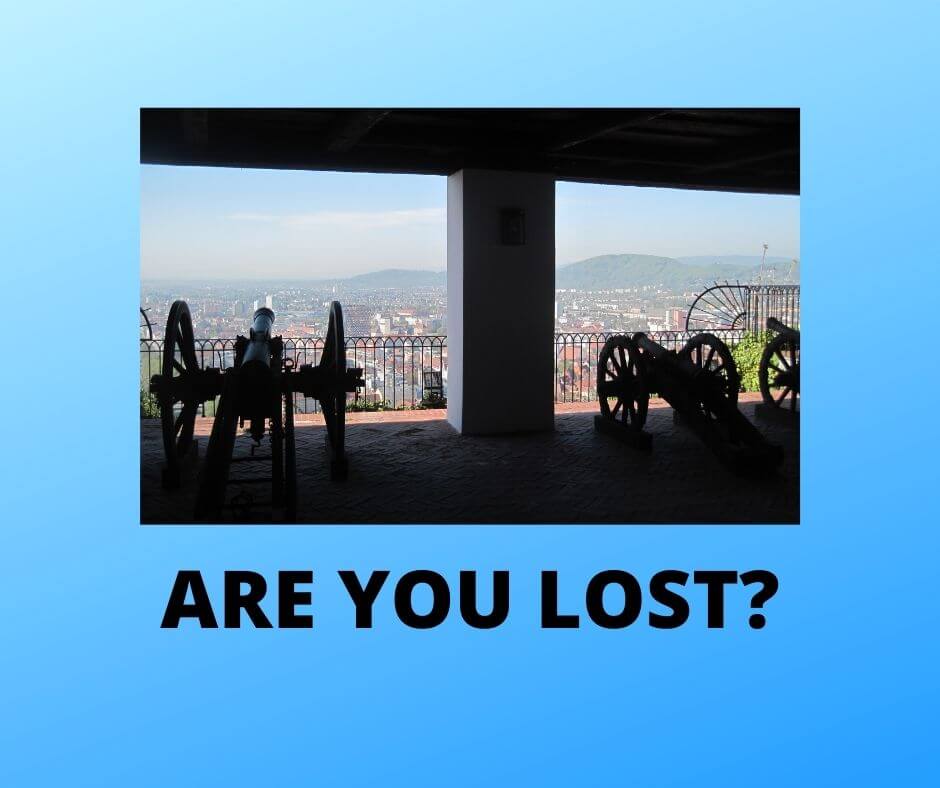
My globe-trotting daughter has learned it is best to not tell her mother details of stressful situations while overseas until after her return. That might mean months or years later. Like car accidents in China. Or getting lost in Austria.
Then she can tell the story and we can share our getting lost stories and we can all laugh and be happy that we are safely together once again. And Mother doesn’t say, “I’m never letting you out of sight again!”
Christine’s story
On a recent road trip, Christine and her dad swapped getting lost stories. Christine and her co-workers went to a southern city in Austria. While they took care of business, Christine went to explore the downtown area. Common in that area, a fortress sat at the high point of the town, so Christine wandered up the path and enjoyed poking around the fortress.
It was a nice spring day, perfect weather, and the flowers were blooming. She came out, headed back down the hill, and then realized she had gone down a different path than the one she had used to go up. But there was a park at the bottom of the hill, so she enjoyed that for twenty minutes.
Then she realized she’d better figure out how to find her co-workers. She had a map, but it didn’t tell her where she was. She knew only one phrase in German: do you speak English? The first person she asked did know English and got her going in the right direction. The second person she asked didn’t but found someone who did. She got on a tram, but quickly realized it was going the wrong direction. By this time, she was in text contact with her co-workers who told her to take the entire loop and they would wait for her. All’s well that ends well, and Mother’s heart is not in panic mode.
Daddy laughed and told a similar story. While in Athens, he took off by himself and got turned around. He didn’t know modern Greek but he knew Biblical, “koine” Greek, so he asked someone “Hodos (Street) Alexandria?” The man yanked one finger to the left and Jack found Alexandria Street, where the hotel was located, one street over. Whew!
Have you been there?
You don’t have to have a case of location dislocation to feel lost. There’s all kinds of wrong turns you can make in life that will make you feel more adrift than a piece of wood in Lake Michigan. We get mired into situations that leave us feeling uncertain, anxious, and not sure what to do next. We shake our heads and say, “I just don’t know what to do.”
Lostness can come from a series of wrong turns or bad decisions. We can be led astray by bad advice or barrel down a road of opportunity, only to come to a screeching halt before a dead end. Sometimes life seasons dump us into unknown territory where we’re just not sure which road leads to where we need to be.
- Divorce
- Retirement
- Job dismissal
- A move across town or across the country
- An ebbing away of purpose
Groups and institutions can lose their way as well. They latch on to a new program or strategy and it doesn’t work. They’ve invested time, money, and people power into the initiative. But they’ve reached a point that they don’t know how to get out of the mess they’ve created. They can either swallow the losses, back out, and change direction. Or they can keep on keeping on, getting themselves more tangled and becoming more aimless in their purpose and function.
Both individuals and groups need to have the courage to admit they’ve lost their sense of direction and to do something about it. If you feel lost, you do have control. You can make changes that will lead you back in the direction you need to be.

Six Roads That Will Lead You Home
As I listened to Christine’s stories of how she got herself out of her “I’m lost” mess, I appreciated how smart this daughter of mine is. Her plan of how to get un-lost showed me how to evaluate where I am when I don’t know where I am and how to move to where I want to be.
Here’s six strategies I learned from her adventures of how to get back on the right track.
Admit
You can’t get found if you don’t admit that you’re lost to begin with. Many spouses chuckle behind their hands at how their significant other won’t admit to lostness. “I know exactly where I am. I’m just not sure how to get where I want to be.” And so they continue to wander down street after street, believing the road they want is just around the corner. Yeah, Dude, admit it. You are lost.
C.S. Lewis once said:
If you’ve taken a wrong turn, to go forward does not get you any further.
Or, as Christine’s co-worker said,
If you keep on doing what you’ve been doing, you’ll keep getting what you’ve been getting.
It takes courage to admit you are lost. But how liberating it is to say those words. It truly is the first step.
Stop
Admitting you are lost is not enough. I’ve admitted I’m lost, but then I go into panic mode. Panic leads to emotional, irrational decisions. I wander around, repeating to myself that I’m lost and this is horrible, but I just make the tangled mess worse. My wandering perpetuates the problem.
If you have a sense that all is not right, your first action point is to stop doing what you’re doing.
- If you are dangerously in debt, don’t keep spending money.
- If an area of town you’ve ventured into starts to look seedy, don’t keep walking further into it.
- If the program your group has implemented has reached a point of implosion, take a break. Furlough the program for a couple of weeks, if that’s possible.
- If life is spinning out of control,, go on a retreat for 24 hours or even two hours, away from the mess so you can give yourself time and space to think.
Continuing to move forward is not beneficial if you are moving forward in the wrong direction. That sounds so logical, yet how many individuals and groups have plowed through anyway? They reason that doing something is better than nothing, or this is all they have known so why bother trying to change? Stop, just stop. There is a better way.
Stopping allows you to turn around. It would have been silly for Christine to keep walking down that wrong side of the hill. She had to stop so she could go the right way. But before she found that right way, she still had to do several things.
Assess
The first step of assessment is to breathe. Stop the panic. This will allow you to think rationally instead of emotionally.
Next, determine the following things:
- Where you are
- Where you’ve come from
- Resources you have
- Your restrictions and limitations
This information will help you know which direction to take and whether you have the means to get to your final destination along that chosen path.
Use what you know
My husband didn’t know a lick of modern Greek. But he knew koine Greek. Christine could have panicked that she didn’t know German. For someone who already knew four other languages, that would have been a frustration. Instead, she used the one phrase she did know. On other trips, she resorted to her knowledge of other languages, such as Russian in Poland. We do have the resources we need to find our way and we have more than we don’t have.
I’m speaking to myself here. As my husband and I face retirement and relocation, sadness overwhelms me at the loss of friends and anxiety over whether I’ll gain new friends in my new city.
But what do I have? I still have all my current friends. Communication will just be different. And I have connections. Friends of friends. This week, I started making inquiries about groups that share my interests. It will take time to develop new friendships, but they are there and I have the reources from past experiences and memories to help me forge those new friendships.
Focus on what is, not on what isn’t.
Ask for help
It’s hard enough admitting to ourselves that we’ve lost our way. It’s even harder to admit it to others, especially when we’ve made intentional choices that got us into the mess.
We’re afraid of losing face. But, like our family learned in the car, everyone gets lost at one time or another. What a reassurance when the other person admits, yes, that happened to them too.
Also, we are a team. We all work together. We cannot do anything by ourselves. Drop the Lone Ranger mentality. You don’t have to do everything by yourself. You do not show weakness when you ask for help. On the contrary, you are showing strength because you are using resources to push forward. It is a wise person who seeks the counsel of others.
Proverbs 15:22 says,
Plans fail for lack of counsel, but with many advisers they succeed.
Proverbs 15:22, NIV
People can become your best resource. The person next to you just might have the one puzzle piece you need to find your way.
Appreciate the Adventure
Like Christine, who discovered that beautiful park in Austria, our family has discovered new restaurants, new attractions, and new friends countless times on our way back to where we need to be. We still talk about the time we were trying to get back to our hotel in southern Missouri from a day trip to Eureka Springs, Arkansas. Along the road, we saw a sign for ThornCrown Chapel so we stopped. A stray thunderstorm opened its fury just as we reached the entrance and this glass roofed building became our shelter. Those few moments became one of the most profound moments of our family’s spiritual walk.
Time restraints may not allow you to linger and see the sights. But you can enjoy the journey later. Revisit the places you didn’t have time for the first time. Save the lessons learned to apply toward the next lost episode. Strengthen yourself in the meantime with preparedness techniques. Learn more German or whatever knowledge base you need to outfit yourself for the next adventure.
And save the story. Think of who you’ll tell and how you’ll tell it. Especially to your mother.

Often, the most difficult thing is realizing your lost and then being willing to ask for help. Especially if you’re a guy. LOL Isn’t it wonderful to know that God is always ready to lend a helping hand to get us back on the right path?
Karen. stop is sometimes the most difficult part of being lost. thanks for good advice i wish you well as you “transition “. love to you with good memories. Clella